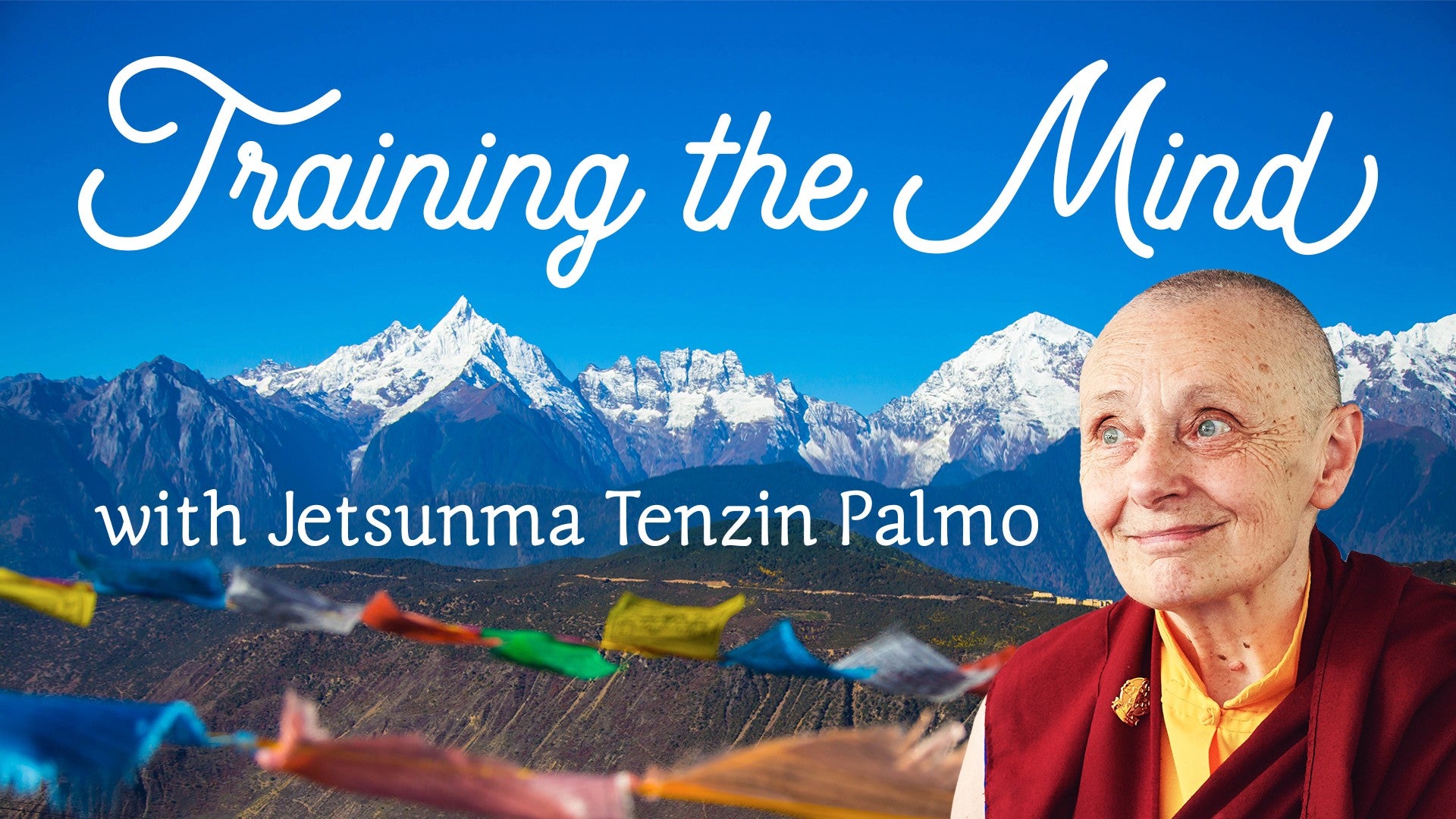Description
About This Video
Transcript
Read Full Transcript
So, therefore, the supreme sign of accomplishment, how do we know, is the continuous decrease of our wishes and wants. So when we're endlessly dissatisfied, always wanting something more, hoping for something more, if only I had this, if only that would go this way, then everything would be good. Then this continual inner discontent and dissatisfaction and grasping outwards the whole time, thinking if only things could go the way I want them to go, and if only I could get the things I need, that everything would be great. When that begins to quieten down, and we recognize, actually, right in this moment, I have everything I need, I have everything more, then that is a sign that we're beginning to, something inside us is beginning to open up. Really the Buddhist mantra, it's not almani pemiho, the Buddhist mantra is let go, let go, let go, outer inner secret, let go.
It's our grasping mind, which is the problem. The Buddha said the source of our dissatisfaction, our dis-ease, our dukkha is the grasping mind. That cannot be emphasized enough. Many people ask about how to deal with anger. Why?
Because anger is uncomfortable. We are not at peace when we're angry, even if we're angry about peace. Anger disturbs the mind, it creates conflict, and it is a very uncomfortable state. So many people ask about how to deal with anger, which is valid. We should wonder how to deal with anger.
But very few people ask how to overcome my greed. Why? Because greed, if it is sometimes satisfied, is pleasurable, we think. And therefore, yeah, of course, we don't want to be so greedy, but it's nice getting what we want. And so people don't put the effort into overcoming the greedy grasping attached mind that they would put into overcoming anger.
But the Buddha said that although anger is eight times, this is called the Pali Canon, eight times more negative in its karmic results than greed, it is also relatively easy to get rid of because we don't like it, whereas greed is extremely difficult to uproot. One time when I was living in Lahoul, this Himalayan region in the cave, outside my cave, there was the cave, and then there was this kind of patio, and then it went down towards a small garden. And so this patio was made of beaten earth. So in the summer, it was OK. But otherwise, when it rained or when the snow melted, it all just became mud.
So I thought, well, I really need to lay down some flagstones. So I heaved these huge, great, big flagstones. But on the patio, there were these little clumps from here and there of little pink flowers with yellow centers, little clusters of flowers, very sweet. But they came up, so you couldn't put the flagstone on top of them, it would wobble. So I thought, right, I have to pull out these pretty little clumps of flowers.
So I started trying to pull them, and I couldn't pull them. So then I got a pickaxe and I started looking where are the roots, where are the roots, and digging deeper and deeper and deeper and further and further away. And finally, I dug up the whole patio because underneath was this whole network of roots, some this thick. And they would spread out all over underneath. And the only sign of them were these pretty little pink flowers.
And I thought, that is just like greed and grasping. It looks very innocent. You know, oh, I like nice house, I like ice cream, I like this, I like that. But underneath, what is fueling that is this deep, thick, psychic undergrowth of desire, which keeps us rooted in samsara. This is why the Buddha said that the cause of our dukkha, the cause of our suffering is desire.
I mean, in Asian words, there are two words for desire. There is good desire and there is negative desire. So grasping and greed is a better term because otherwise people say, well, even the desire for the well-being of other beings or desire for enlightenment, but it's a different word. In English, it's the same word, so it gets confusing. But it's this grasping, greedy, desiring mind which underlines our whole existence, which has to be uprooted.
And it looks innocent often. That's the harm. But the harm is that this is grasping, which causes our suffering because everything is impermanent. And so we hold on to things and people with our attachment. And that actually thinking that if we hold on tightly, that that will make us secure is the very thing which creates our sense of insecurity.
Because everything's impermanent, everything's going to pass. At the very least when we die, we leave everything behind, right? Nothing we are taking with us except our basic consciousness and the karma. That's it. People, possessions, position, gone.
But in the meantime, we also lose people, possession, position. And depending on the extent of our grasping and attachment, the more pain we're going to feel. So this doesn't mean, of course, that when things come our way, we cannot enjoy them. And when people come, we cannot love them. But to enjoy and to love with open hands instead of tightly grasping.
It's the extent of our grasping which is the problem. Not the loving. I mean, the Buddha always encouraged us to have love. I mean, his example of loving kindness is of a mother to her only child. That selfless love that the mother would do anything for her child.
He said, that's the kind of love we want, which puts the child first. But then that love, we extend to all sentient beings. That's the point. Not that just we stick with our child, but using that as a basis, our love and compassion for a being who is so closely connected to extend that feeling towards all other beings. Those we like, those we're indifferent towards, those we don't like.
And then outwards, recognizing that all beings wish for happiness and don't want suffering. So this is a very, very important aspect of the path. Of course, as long as we are still clinging to the ego, we are not going to completely rid ourselves of clinging to others. But slowly, slowly, there is an example, which is kind of vocal of when if we have a little baby chicken, a day old chicken, a little chick, then if we have that chick, we will hold it like this. Because if we go like this, no chicken.
So that's the idea, that we hold things very tenderly, very nurturing, but without strangling them. We could go on like this forever, but we have a lot of mercy to get through. But it's important to remember that the Buddha did say that the cause of our dissatisfaction, the cause of our suffering, our dukkha, is because of the grasping mind. The grasping mind depends on our ego, but nonetheless, it's this grasping which is the problem. Not love and compassion.
Those are good things, but it's this inability to hold openly without wanting to control and to own and to keep it. So sometimes I say that attachment, because people get confused, attachment means I love you, attachment to a person. I love you, therefore I want you to make me happy. Genuine love says, I love you, therefore I want you to be happy. That includes me, very good, if it doesn't, your happiness is what counts, that's genuine.
Training the Mind with Jetsunma Tenzin Palmo
Comments
You need to be a subscriber to post a comment.
Please Log In or Create an Account to start your free trial.











